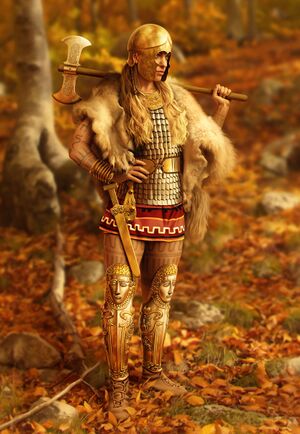Vaenera
| Vaenera Aurelia | |
|---|---|
| Imperatrix | |
 Illustration of Vaenera based on contemporary depictions | |
| Predecessor | Caius Aurelius |
| Successor | Decimus Aurelius |
| Born | 13 May 301 BCE Ravenna, Acrea |
| Died | 24 November 230 BCE Ravenna, Acrea |
| Religion | Valstígr |
Vaenera of the Aurelii (Elder Nordic: Vaenera Caíusar, Venetian Latin: Vaenera Avrelia), was an Arcanus who later served Imperatrix of Ravenna in the Acrean Empire, governing from 271 BCE until 230 BCE during the reign of Emperor Vetericus.
Vaenera was the eldest daughter of Caius Aurelius, a famed Ravennese General and one of the key figures in the formation of the empire. Rather than adopt a lifestyle typical of Acrean woman of the period, Vaenera became a warrior, training under her father's tutelage and first gaining experience during the Second Acro-Sabrian War. During this period she was elevated to the status of her father's heir apparent as imperator in Ravenna after her elder brothers assumed high ranking military positions in Rena and was married to Aegaron, the second son of Vithmirax. She was affirmed as imperatrix following Caius' death in 271 BCE.
Occuring during the formative years of the empire, Vaenera's reign as imperatrix of Ravenna is today considered to be critical to the city's development as a cultural, economic, and political center in the newly unified state. Several key policies championed by Vaenera contributed to this. Modern historians especially attribute her policy of uniting Venetia under the Ravennese banner as decisive in shaping the modern cultural landscape of Acrea, as it ensured the parity of Latin-speaking Acrea with the Nordic-speaking north, resulting in the distinctive modern culture and language of Venetia. Additionally, Vaenera's rule reinforced internal stability in Acrea at a pivotal point in the empire's history, as her support and political alliances provided vital legitimacy to the still-new imperial government within southern Acrea.
Early Life
Born in pre-Imperial Ravenna, Vaenera was raised for most of her life immersed in the world of higher nobility and politics. Despite being the eldest daughter, Vaenera followed her two older brothers and father into military life rather than following the traditional Acrean female path of politics and domestic life. At the time, this was highly unusual for a noblewoman in particular; military service in ancient Acrea was traditionally viewed as a male profession, which contributed to the high civil and political standing of women in ancient Acrea relative to other ancient societies.